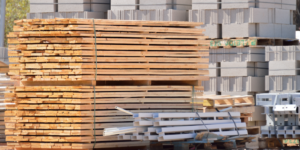
As the construction industry recovers from the past two years of the COVID-19 pandemic and its subsequent challenges, some old problems continue to plague projects — including theft.
Okland Construction project manager Mason Harvey’s project lost $10,000 worth of materials to masked thieves just last month.
“You see ski masks in action movies, but here when you only see someone’s eyes and mouth you know it’s a bad situation,” Harvey said about the experience.
United Contractors’ Jason Robichaud added that he’s seen site theft grow into a major problem in recent years.
“It is a systemic problem in our industry, and anybody in general contracting you speak with right now will say that they’ve been experiencing theft,” Robichaud said.
These problems are happening all around the country: A report from Fayetteville, Georgia on April 13, 2022, noted that local thefts had targeted construction materials.
It’s not necessarily something that grew from the effects of the pandemic, either.
“We saw a big shift in 2019 when it got progressively worse and more brazen,” Robichaud continued. “It’s gotten to the point where [thieves] are cutting water lines to completely take out an entire commercial building plumbing system for the copper.”
Site theft causes problems for contractors that go far beyond the loss of property. As Levelset’s Tom Scalisi notes, insurance claims on construction sites can increase premiums, making coverage more expensive. Then, even if they receive an insurance payout, the impact on cash flow may cause further problems — unsurprising given that 97% of respondents to Levelset’s 2021 Construction Cash Flow & Payment Report noted stress from cash flow problems.
“At the end of the day, the consumer is the party who suffers because insurance companies and construction companies have to pass along those costs,” said Mark Hunter, a builders risk insurance broker with Summit Risk Management and Insurance.
“It’s just cause and effect,” Hunter added. “As theft rises, insurance claims rise, and insurance premiums will rise correspondingly. This happened a lot in the post-2008, 2009 downturn of the economy, and we’re experiencing it again right now.”
Cash flow problems extend further, too, as these issues can also cause major schedule delays.
“When material gets stolen off our site, it increases our procurement costs and it especially affects our schedules. Our employees aren’t able to do their work and it makes it hard to do a job within a time frame. It has a trickle down effect on our whole team,” said Austin Hunsaker, a risk and safety manager at Okland Construction.
As Tom Scalisi points out, a significant amount of construction theft happens internally, making it all the more important to go through proper contractor prequalification processes before hiring anyone. Along with proper site security measures, precautions like this can go a long way.
It’s also important to keep an eye on what items are most commonly stolen — and what things could be at risk next. Tools, lumber, appliances, copper, and equipment are commonly taken from sites, and with construction costs skyrocketing, companies may be able to keep an eye on what is most at risk for being targeted in the future with price tracking.
With issues in the industry continuing to affect so many, it may be that situations like these continue — making it all the more important to keep abreast of all the ways one can protect their business.
“I’m surprised at what people do to get something like roofing membrane,” added Harvey. “I know it’s hard to come by, but the fact that individuals will go to the measures of taking off license plates, wearing ski masks and dark clothing, and risk coming onto a busy job site like ours where we have over 100 employees working every day to get a few rolls of TPO — that’s surprising.”

